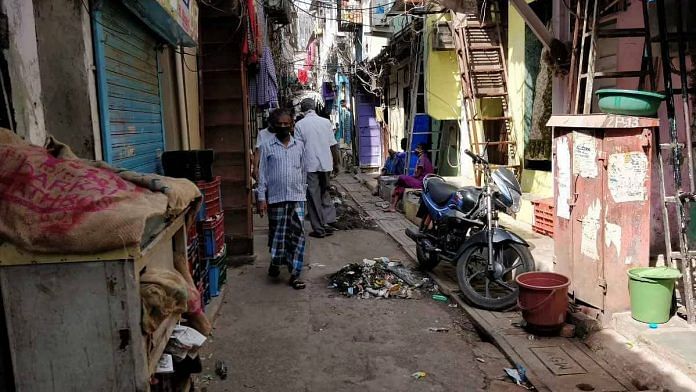Mumbai: The Uddhav Thackeray-led Maha Vikas Aghadi (MVA) government has approved a plan to revive more than 500 stalled slum redevelopment projects in Maharashtra by picking new developers, appointing the scheme’s financiers as co-developers, and drawing up strict timelines for their completion.
These projects have been “languishing for years, with the developers in charge having stopped paying rent to the eligible slum-dwellers for alternative accommodation”, an official with the state Housing Department told ThePrint.
In a 25 May notification, the Housing Department allowed the Slum Redevelopment Authority (SRA) to allot such projects to new developers selected through a tender process. The SRA was authorised to run an amnesty scheme under which financial institutions that have invested in these projects can come forward to complete them. ThePrint has a copy of the notification.
In 1995, the Manohar Joshi-led Shiv Sena-BJP coalition government set up the SRA for the purpose of providing free houses to all slum-dwellers. Back then, the plan was to build 20 lakh houses for Mumbai’s then 40 lakh families living in slums. The projects were to take place in slums that had come up before 1995.
The scheme, however, did not take off as envisaged by the then government. According to the Maharashtra Economic Survey Report for 2021-22, the SRA completed only 2,067 projects and rehabilitated 2,23,471 families from 1995 to August 2021 — a little over 5 per cent of the target set by the then Shiv Sena-BJP government.
Some of the reasons for the delay in the delivery of projects were related to both builders and slum-dwellers, such as non-compliance of Floor Space Index (the maximum permissible floor area which a builder can build on a plot), and lack of unanimity among slum-dwellers.
In 2001, the S.S. Tinaikar Committee came out with damning findings on irregularities in implementing these projects. Relaxation of guidelines, favour to select developers, and disbursal of excess funds were among the alleged issues flagged by the panel. The government of the day accepted the report, but did not implement it.
ThePrint reached Satish Lokhande, chief executive of the SRA, by phone but no response was received by the time of publishing this report.
Also Read: Hand washing to stop coronavirus — 78% of toilets in Mumbai slums lack reliable water supply
Tender for new developers, amnesty schemes
Many projects have been affected by the Covid lockdowns and demonetisation, the Housing Department official explained. “Private developers in charge of these projects are not doing too well financially, so a lot of these projects are stalled, and there’s a lot of dissatisfaction among slum-dwellers,” the official said.
Multiple meetings among the SRA, the developers and the slum-dwellers have failed to yield any result, the official said, adding that different waivers granted to developers in premiums and other charges too failed to get the stalled projects back on track.
According to the government’s notification, the SRA will create a list of empanelled developers chosen through the tender route to complete the projects stuck mid-way. Such projects will be reassigned to the developers from this list.
The developer that proposes to handover the maximum built-up area from the project’s sale component to the government as affordable housing will be assigned the project, the notification says.
The 25 May government notification clarifies that the SRA will not require consent of the slum-dwellers while re-assigning stalled projects to developers from the empanelled list or to financial institutions.
Under an amnesty scheme announced by the government, financial institution(s) associated with a particular stalled project can approach the housing authorities for completing work. The name of such financial institutions shall be entered in the Letter of Intent of such a scheme as ‘co-developer’ or ‘lender’.
For this purpose, the SRA published a public notice on 2 June, inviting such financial institutions to come forward with their proposals. Only those financial institutions recognised by the Reserve Bank of India (RBI), the Securities and Exchange Board of India (SEBI) or the National Housing Board (NHB) can avail of this benefit.
“Different financial institutions invest in the slum redevelopment projects, and developers often give them a certain portion of the project’s sale component to sell in return for their investment. Many times, developers get the financing but don’t complete the project’s rehabilitation portion and stall rentals to eligible slum-dwellers,” the official said, explaining how financial institutions stand to benefit.
“These financial institutions cannot take over the project though they have the financial ability to simply because they are not listed with the SRA. The amnesty scheme will now allow them to complete these schemes,” he added.
Also Read: ‘Dharavi model’ back in action after active cases surge seven times in Asia’s largest slum
Strict timelines and penalties
Developers and financial institutions will have three years to complete an average slum redevelopment project.
In the first year, the developers will have to complete at least 33 per cent of the total scope of work while the threshold is set at 66 per cent for the second year. Failure to do so will result in penalties, according to the notification. For projects of an unusually large scope, the SRA will set separate timelines for the developers.
Another criterion set for the new builders and financial institutions is ensuring that slum-dwellers eligible for rehabilitation get rent on time till the project is completed.
Also, the SRA will give a Letter of Intent for the stalled projects only once the authority and the developers reach some agreement about how to pay the rent pending so far to the slum-dwellers. If these developers too fail to complete the project, the SRA will not accept any project proposal from them in the future.
(Edited by Tony Rai)
Also Read: ‘Will you demolish 80% of Delhi,’ asks Kejriwal of BJP-led civic drive to remove encroachment



